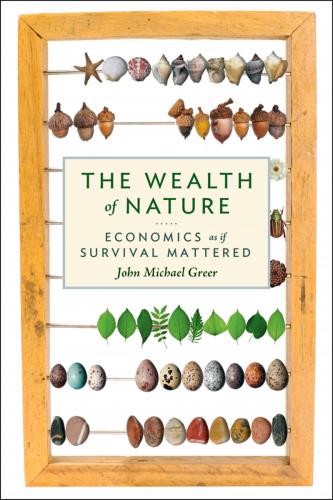ADVANCE PRAISE FOR
The Wealth of Nature
John Michael Greer has done something that desperately needs doing, for all our sakes: he has re-thought economics, starting from its fundamental premises, giving it a basis in ecological reality rather than political fiction. In doing so, he acknowledges his predecessors (principally, E. F. Schumacher), while contributing his own wry verbal style and impressive knowledge of history. The result is perhaps the most important and readable book on economics since Small Is Beautiful.
— Richard Heinberg, author of The End of Growth
Economics has often been called the dismal science, not the least because it is a boring read. John Michael Greer has changed all that. His Wealth of Nature is a romp through the past, present and then the very near future, fribbling iconoclasticly with Adam Smith, E.F. Schumacher and Nouriel Roubini. Anyone who does not believe or comprehend why civilization is collapsing, or would enjoy hearing it told well, should read this excellent rendering.
— Albert Bates, author of The Post Petroleum Survival Guide and Cookbook and The Biochar Solution
John Michael Greer writes with unsurpassed clarity about the predicaments of energy and economy mankind faces. And he does it with a wonderfully kind, genial, and wise spirit. This is the must-read book for anyone who wishes to make it through the coming turbulence.
— James Howard Kunstler, author of
The Long Emergency and World Made by Hand
THE WEALTH
of NATURE
THE WEALTH
of NATURE
ECONOMICS as if SURVIVAL MATTERED
John Michael Greer
Copyright © 2011 by John Michael Greer.
All rights reserved.
Cover design by Diane McIntosh.
All photos ©iStock (abacus — Garry518; shells — tacojim; acorns — tshortell;
daisy — egal; beetle — robisklp; pine cone — SamCastro; leaves — AlexMax;
eggs — Ornitolog82; stones — svstiv)
Printed in Canada. First printing March 2011.
Paperback ISBN: 978-0-86571-673-5 eISBN: 978-1-55092-478-7
Inquiries regarding requests to reprint all or part of The Wealth of Nature should be addressed to New Society Publishers at the address below.
To order directly from the publishers, please call toll-free (North America)
1-800-567-6772, or order online at www.newsociety.com
Any other inquiries can be directed by mail to:
New Society Publishers
P.O. Box 189, Gabriola Island, BC V0R 1X0, Canada
(250) 247-9737
New Society Publishers’ mission is to publish books that contribute in fundamental ways to building an ecologically sustainable and just society, and to do so with the least possible impact on the environment, in a manner that models this vision. We are committed to doing this not just through education, but through action. Our printed, bound books are printed on Forest Stewardship Council-certified acid-free paper that is 100% post-consumer recycled (100% old growth forest-free), processed chlorine free, and printed with vegetable-based, low-VOC inks, with covers produced using FSC-certified stock. New Society also works to reduce its carbon footprint, and purchases carbon offsets based on an annual audit to ensure a carbon neutral footprint. For further information, or to browse our full list of books and purchase securely, visit our website at: www.newsociety.com
Library and Archives Canada Cataloguing in Publication
Greer, John Michael
The wealth of nature : economics as if survival mattered / John Michael Greer.
Includes bibliographical references.
ISBN 978-0-86571-673-5
1. Economic development--Environmental aspects. 2. Environmental economics. 3. Sustainable development. I. Title.
HD75.6.G74 2011 338.9 C2011-900654-5
Contents
Introduction: A Guide for the Perplexed
3 The Metaphysics of Money
4 The Price of Energy
5 The Appropriate Tools
6 The Road Ahead
Afterword: Small Is Beautiful
Notes
Bibliography
About the Author
Introduction: A Guide for the Perplexed
More than two centuries have passed since Adam Smith, a Scots philosopher with a clergyman’s training and a previous reputation mostly as a moralist, launched the modern science of economics with a book entitled The Wealth of Nations. The first widely accepted analysis of how markets guide economic behavior, Smith’s book quickly took on the status of a classic. Its approach to the subject of economics has dominated the field ever since; just as Bertrand Russell famously defined all of Western philosophy as “footnotes to Plato,” it would be by no means inappropriate to define all of modern economic thought as footnotes to Smith.
While Smith’s work deserves its reputation, the timing of its publication also had a good deal to do with the way it came to dominate the field it brought into being. It was published the same year that America’s Declaration of Independence was signed, and just as Britain was launching the social and technological transformations that would make it the world’s first industrial society. Smith’s central thesis — that a market economy governs itself through what would today be called feedback loops, and thus does not need close government supervision — appealed to audiences who were well primed by the events of the day to question the need for government intrusion in private economic affairs, while the rising class of industrial entrepreneurs found their own reasons to support an analysis that claimed to justify their interest in making as much money with as little interference as possible.
The meteoric expansion of the industrial economy over the two centuries that followed was marked, in turn, by the rise to prominence of the profession of economics. In Smith’s time, professional economists did not yet exist; today they rank among the most prominent figures
